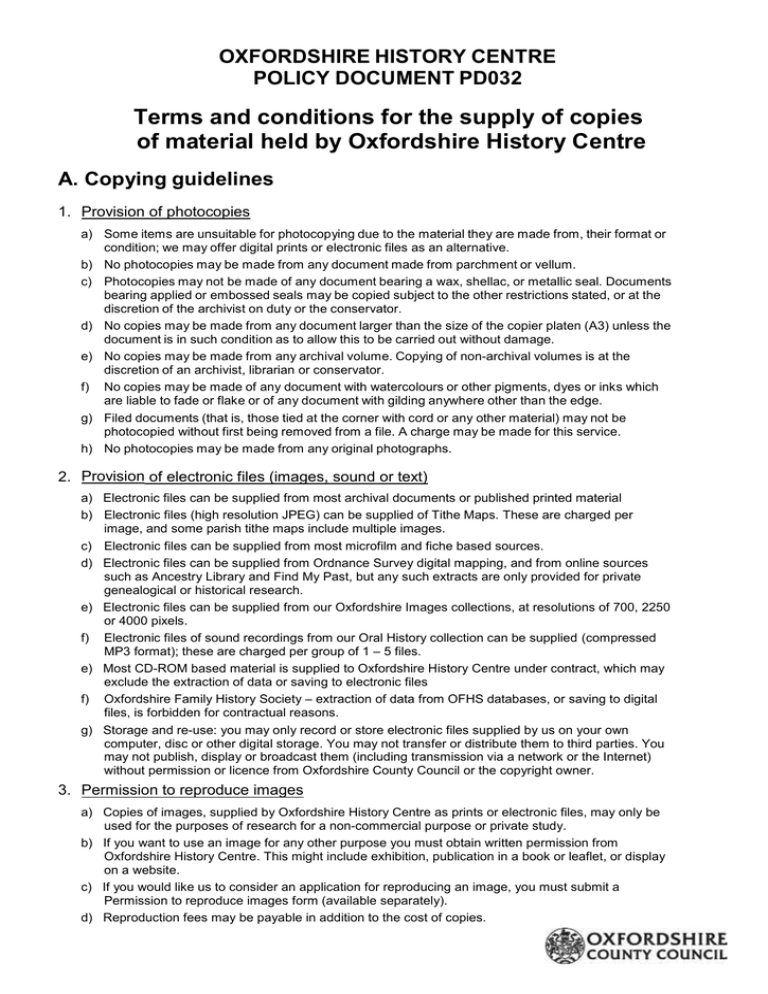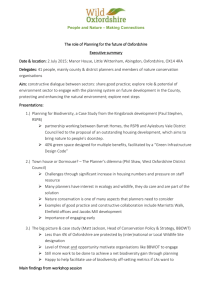A4 publication - Oxfordshire County Council
advertisement

OXFORDSHIRE HISTORY CENTRE POLICY DOCUMENT PD032 Terms and conditions for the supply of copies of material held by Oxfordshire History Centre A. Copying guidelines 1. Provision of photocopies a) Some items are unsuitable for photocopying due to the material they are made from, their format or condition; we may offer digital prints or electronic files as an alternative. b) No photocopies may be made from any document made from parchment or vellum. c) Photocopies may not be made of any document bearing a wax, shellac, or metallic seal. Documents bearing applied or embossed seals may be copied subject to the other restrictions stated, or at the discretion of the archivist on duty or the conservator. d) No copies may be made from any document larger than the size of the copier platen (A3) unless the document is in such condition as to allow this to be carried out without damage. e) No copies may be made from any archival volume. Copying of non-archival volumes is at the discretion of an archivist, librarian or conservator. f) No copies may be made of any document with watercolours or other pigments, dyes or inks which are liable to fade or flake or of any document with gilding anywhere other than the edge. g) Filed documents (that is, those tied at the corner with cord or any other material) may not be photocopied without first being removed from a file. A charge may be made for this service. h) No photocopies may be made from any original photographs. 2. Provision of electronic files (images, sound or text) a) Electronic files can be supplied from most archival documents or published printed material b) Electronic files (high resolution JPEG) can be supplied of Tithe Maps. These are charged per image, and some parish tithe maps include multiple images. c) Electronic files can be supplied from most microfilm and fiche based sources. d) Electronic files can be supplied from Ordnance Survey digital mapping, and from online sources such as Ancestry Library and Find My Past, but any such extracts are only provided for private genealogical or historical research. e) Electronic files can be supplied from our Oxfordshire Images collections, at resolutions of 700, 2250 or 4000 pixels. f) Electronic files of sound recordings from our Oral History collection can be supplied (compressed MP3 format); these are charged per group of 1 – 5 files. e) Most CD-ROM based material is supplied to Oxfordshire History Centre under contract, which may exclude the extraction of data or saving to electronic files f) Oxfordshire Family History Society – extraction of data from OFHS databases, or saving to digital files, is forbidden for contractual reasons. g) Storage and re-use: you may only record or store electronic files supplied by us on your own computer, disc or other digital storage. You may not transfer or distribute them to third parties. You may not publish, display or broadcast them (including transmission via a network or the Internet) without permission or licence from Oxfordshire County Council or the copyright owner. 3. Permission to reproduce images a) Copies of images, supplied by Oxfordshire History Centre as prints or electronic files, may only be used for the purposes of research for a non-commercial purpose or private study. b) If you want to use an image for any other purpose you must obtain written permission from Oxfordshire History Centre. This might include exhibition, publication in a book or leaflet, or display on a website. c) If you would like us to consider an application for reproducing an image, you must submit a Permission to reproduce images form (available separately). d) Reproduction fees may be payable in addition to the cost of copies. B. Copyright Note: Oxfordshire History Centre staff cannot give legal advice but may be able to clarify the duration of copyright in a particular case. The Intellectual Property Office provides a basic overview of the principles of copyright at www.gov.uk/copyright, and has also issued guides to how copyright affects research in libraries and archives: Exceptions to copyright: Libraries, archives and museums (2014) – http://bit.ly/ipo_libs – (PDF 286 Kb) Exceptions to copyright: Research (2014) – http://bit.ly/1M3Vp8A (PDF, 288 Kb) 1. General guidelines a) Most of the material held in Oxfordshire History Centre is covered by copyright legislation, and in most cases that copyright is not held by us – it may not even be held by the person who deposited the material. b) We cannot, therefore, give permission to take copies for anything other than private research (which can only be a small proportion of any work or document) and particularly not for publication. c) If you wish to publish, it is your responsibility to obtain permission from the copyright owner, which will often mean investigating who the copyright owner is. d) We can only supply multiple copies or substantial extracts of material which is out of copyright, or which is Oxfordshire County Council copyright. 2. Copyright duration a) Under the terms of the Copyright, Designs and Patents Act (1988) and subsequent Regulations, copyright in most materials subsists within the European Union for the author’s lifetime plus 70 years; but unpublished works, Crown copyright works and photographs may be subject to different conditions. Staff cannot give legal advice but may be able to clarify the duration of copyright in a particular case. 3. Copying material for commercial purposes a) Under Regulations from October 2003 the copying of copyright material for commercial purposes without permission or licence is forbidden. 4. Copyright and Publication Right a) Copyright and Publication Right in any copies or electronic files supplied by us are reserved to Oxfordshire County Council. You will acknowledge the Council's ownership of copyright in the copies we supply and the copyright of the materials being copied, and you will do nothing to prejudice either copyright. Copyright and publication right in copies supplied by us under licence are reserved by the relevant copyright holder; should you ever consider further reproduction you must obtain the permission of the copyright holder. 5. Re-use of Public Sector Information a) Under the Re-use of PSI Regulations from July 2015 you can see, copy, and re-use information that is produced by Oxfordshire History Centre (e.g. our catalogues, indexes, and policy statements), provided that it is not subject to Data Protection (e.g. our accessions registers, containing personal data). b) Under the Re-use of PSI Regulations you can see archives and local studies material held at Oxfordshire History Centre free of charge. You can copy much of this material for personal use, but the law for re-use is more restrictive and, since the copyright of a significant proportion of our collections belongs to a third party, such material falls outside the scope of the Re-use of PSI Regulations. Any copying that is done must conform to our Copying Guidelines in Section A above, and normal charges (www.oxfordshire.gov.uk/oxfordshirehistorycharges) will apply. Mark Lawrence History Centre Manager revised 2 January 2016

